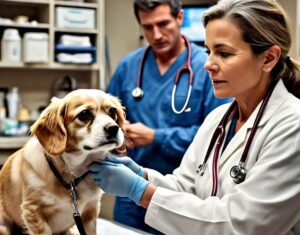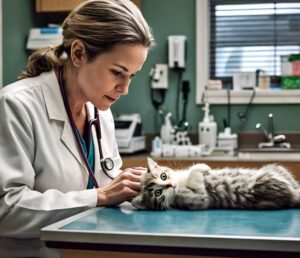Introduction
Pets are more than just companions—they’re family. As caring pet owners, we want to give them the best possible life. However, unlike humans, pets cannot tell us when they feel unwell. That’s why proactive healthcare, specifically preventive care, is essential to keep our furry friends healthy and happy.
Why Preventive Care Matters
Preventive care includes measures designed to prevent diseases and catch health issues before they worsen. This approach involves regular veterinary checkups, vaccinations, parasite prevention, dental care, and a healthy lifestyle. Investing in these preventive steps reduces the risk of serious health problems, enhancing your pet’s quality of life.
Routine Vet Checkups: The Cornerstone of Care
Routine checkups form the foundation of effective preventive care. During these visits, your vet will conduct a comprehensive physical examination, review your pet’s health, and address any concerns. Regular checkups bring multiple benefits:
- Early Detection: Vets can catch health issues early, allowing for more effective treatments.
- Personalized Advice: Your vet tailors recommendations to your pet’s age, breed, and lifestyle.
- Prevention Strategies: Vaccinations and parasite prevention protect against common illnesses.
- Behavioral Guidance: Vets offer insights on training, socialization, and behavioral issues.
- Diet and Nutrition: Vets can recommend the best diet to meet your pet’s specific needs.
Physical Exams: An Essential Part of Every Visit
A thorough physical exam is a vital component of any vet checkup. Here, the vet examines various aspects of your pet’s health, including:
- Vital Signs: Monitoring heart rate, respiratory rate, and temperature.
- Weight & Condition: Tracking weight changes and body condition score.
- Eyes & Ears: Checking for infections, inflammation, or foreign objects.
- Teeth & Gums: Identifying signs of dental disease or gum inflammation.
- Skin & Coat: Looking for parasites, allergies, or skin conditions.
- Musculoskeletal System: Assessing for lameness, joint issues, and muscle tone.
- Heart & Lungs: Listening for abnormalities in heart and lung sounds.
- Abdomen: Feeling for organ irregularities or signs of discomfort.

Vaccinations: Building Immunity
Vaccinations are essential to guard your pet against contagious diseases. They stimulate the immune system to produce antibodies, preparing the body to fight specific infections. Regularly updating your pet’s vaccinations is critical—your vet can guide you on the best schedule for each stage of your pet’s life.
Parasite Prevention: A Must for All Pets
Parasites like fleas, ticks, and worms can lead to severe health issues. Regular preventive measures, like topical treatments or oral medications, are effective in protecting your pet from these harmful pests. Parasite prevention also includes keeping your pet’s environment clean and checking for pests after outdoor activities.
Dental Care: Supporting Overall Health
Dental issues are common in pets and can lead to pain, infections, and even systemic health problems. Routine dental care, including brushing and professional cleanings, helps maintain oral health and prevent dental disease, which can impact their overall health and happiness.
The Impact of a Healthy Lifestyle
A healthy lifestyle makes a big difference in your pet’s overall well-being. Key factors include:
- Proper Nutrition: Providing a diet that meets all your pet’s nutritional needs.
- Regular Exercise: Helping maintain a healthy weight and muscle tone through daily activity.
- Stress-Free Environment: Creating a calm, safe space to reduce anxiety.
- Mental Enrichment: Engaging your pet with toys, puzzles, and interactive play.

Financial Benefits of Preventive Care
While preventive care requires an upfront commitment, it can save money in the long run. Early detection and treatment often cost less than managing advanced illnesses. Plus, a healthy pet is less likely to need emergency care, sparing you from unexpected expenses.
Overcoming Obstacles to Preventive Care
Preventive care benefits are clear, yet some pet owners face challenges accessing consistent care. Here are some tips:
- Budgeting for Care: Set aside funds for routine checkups and preventive treatments.
- Consider Pet Insurance: Insurance can help cover unforeseen veterinary costs.
- Seek Community Resources: Look into affordable care options in your area.
- Promote Awareness: Spread the word on the importance of preventive care for pets.
King Road Animal Hospital: Your Trusted Partner in Pet Health
Located at 141 King Road in Richmond Hill, King Road Animal Hospital is committed to helping you prioritize your pet’s health. Our experienced team, including Drs. Ihsan Ullah, Ahmad Amin, and Muhammad Naveed, offers thorough pet exams and personalized care. With our expertise, your pet’s health and happiness are always in good hands.
Conclusion
Preventive care is an invaluable investment in your pet’s health and happiness. By scheduling regular checkups, maintaining a vaccination schedule, prioritizing parasite prevention, and encouraging a healthy lifestyle, you set the foundation for a longer, healthier life. Your pet’s well-being is ultimately in your hands—ensure it’s a priority today!

